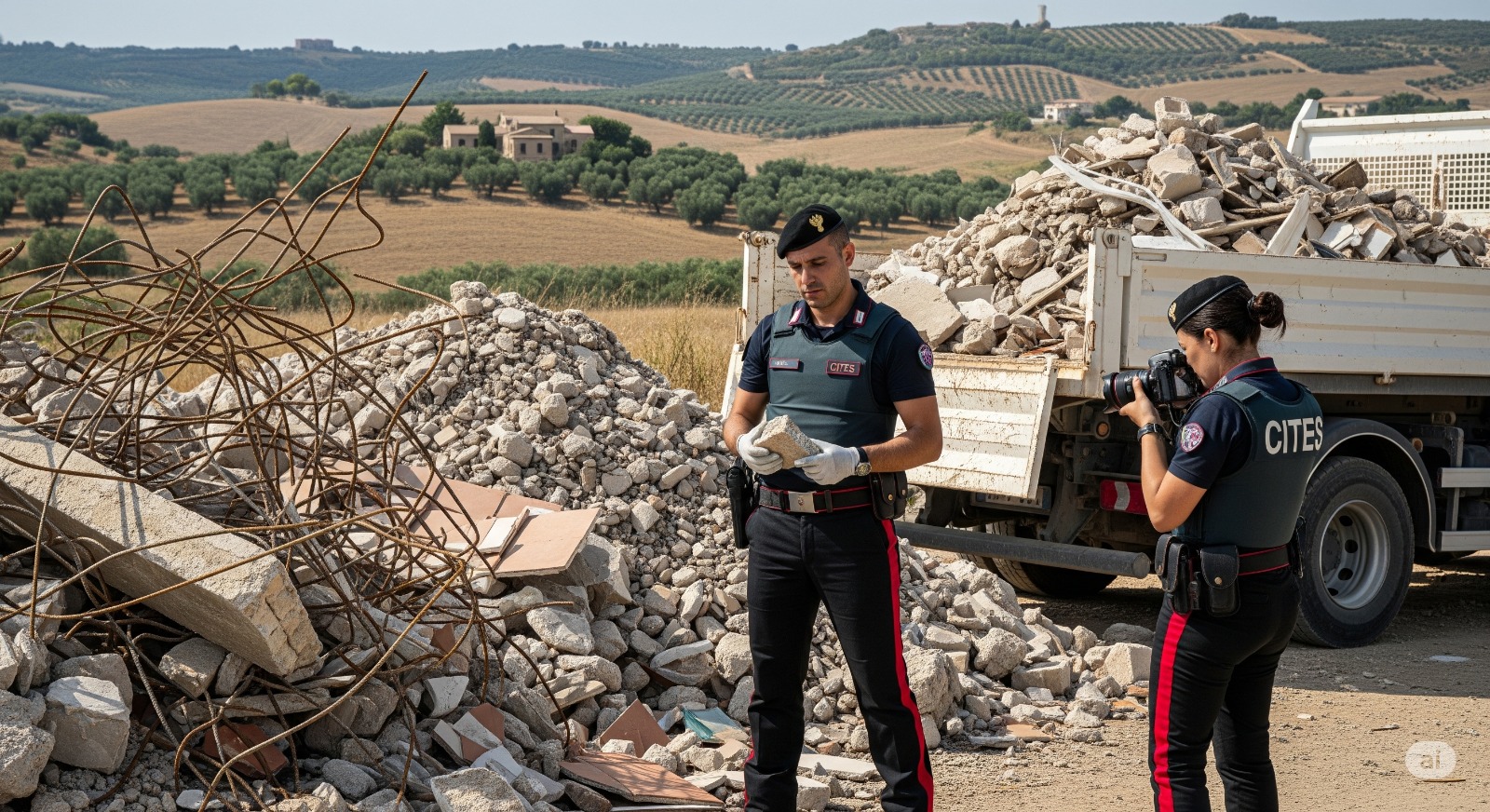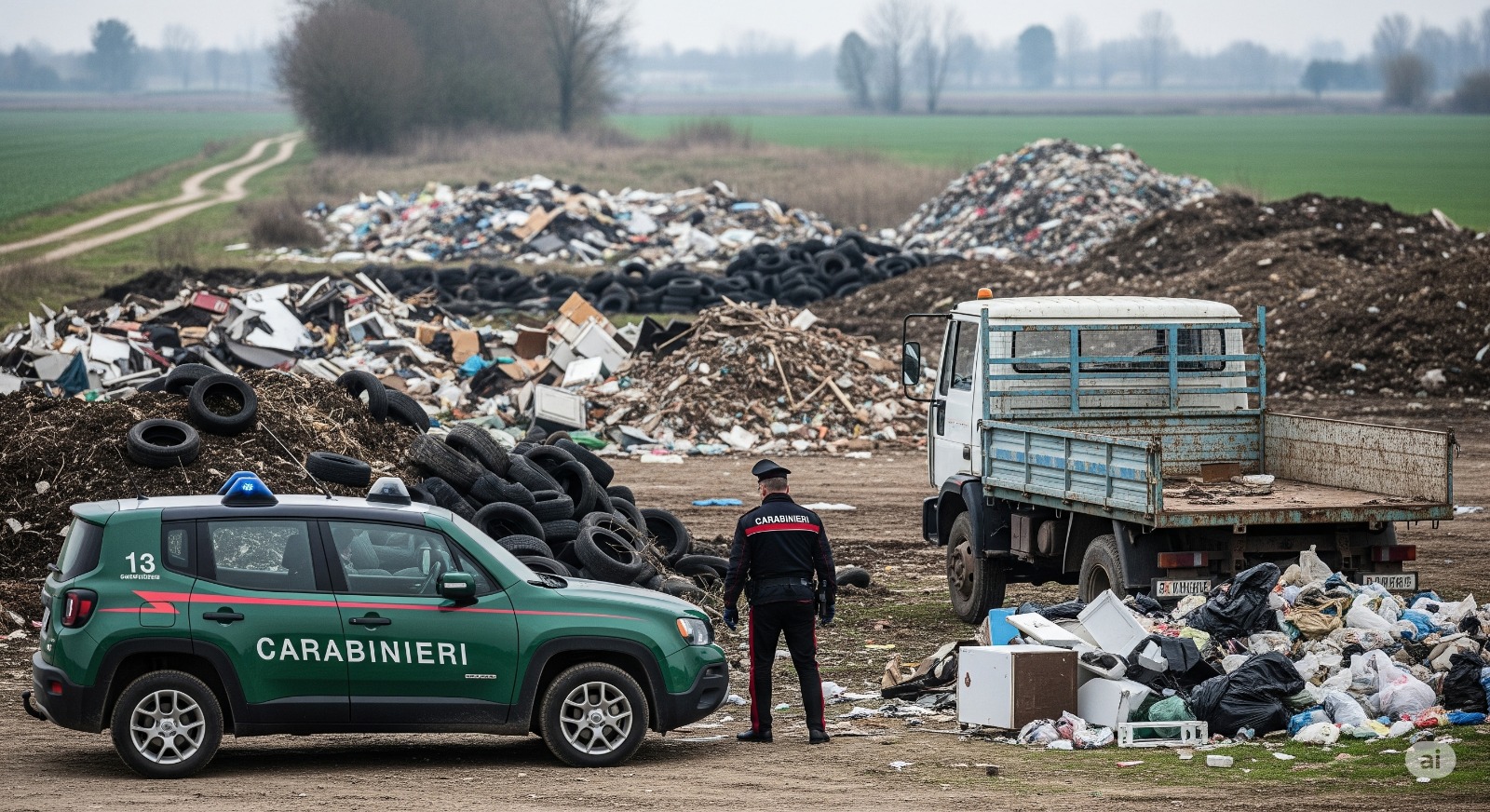Marsala environmental crime: The Shocking Truth Behind Sicily’s Environmental Crime Wave
In today’s world, environmental crime has become a serious global issue, and Italy’s beautiful city of Marsala is no exception to this growing problem. A shocking incident recently came to light that shows us how some people don’t hesitate to harm nature for their own benefit.
On August 19, 2025, a 49-year-old man in Marsala was caught red-handed illegally dumping construction waste in a protected area. This isn’t just an isolated incident, but part of a bigger picture of rising environmental violations across Sicily that’s got everyone talking.
The drama unfolded when Italian authorities discovered this environmental criminal in the act, leading to his immediate arrest and truck seizure. But what’s the real story behind this case, and why should we all care about it? Marsala environmental crime
Marsala environmental crime
The Dramatic Bust: What Really Happened That Day
Caught in the Act: A Real-Life Environmental Crime Scene
That fateful day, the Carabinieri’s Palermo Nature Crime Unit was conducting their routine patrol in the Trapani area. These aren’t your ordinary police officers – they’re part of the specialized CITES division that focuses specifically on environmental crimes.
As they patrolled a protected rural area, something caught their attention. A commercial truck was parked in a suspicious location, and the officers could see construction debris and building materials being illegally dumped into the pristine countryside.
Here’s where it gets interesting: when the law enforcement officers approached to confront the suspect, he tried to flee the scene! In his panic, he scattered some of the waste along a dirt road, creating an even bigger mess. But the authorities were quick to act and successfully apprehended him before he could escape.
Marsala environmental crime
Swift Justice: Legal Action and Consequences
The officers didn’t just arrest the suspect – they seized his truck and all the illegal cargo. This case has been registered under charges of illegal transportation and disposal of construction waste, which carry serious penalties under Italian environmental law.
The swift action by the Carabinieri sends a clear message: environmental crimes won’t be tolerated, and violators will face the full force of the law.
Sicily’s Environmental Crime Crisis: Why It’s Getting Worse
The Perfect Storm: Geographic and Economic Factors
Marsala is a historic town located in the Trapani province of Sicily. This area represents a perfect combination of agriculture, tourism, and rich biodiversity. However, these same characteristics that make it beautiful also make it vulnerable to illegal dumping.
Why do criminals target places like Marsala for illegal waste disposal?
Remote Locations: Rural areas offer easy access with minimal surveillance Less Detection Risk: Criminals believe they’re less likely to get caught Cost Savings: Avoiding proper disposal fees saves money short-term Weak Enforcement: Historically, environmental crimes weren’t prioritized
Environmental Devastation: The Hidden Costs of Illegal Dumping
Construction waste isn’t just unsightly – it creates serious environmental hazards that affect entire ecosystems:
Soil Contamination: Building materials contain chemicals that degrade soil quality over time. This affects agricultural productivity and food safety.
Water Pollution: Toxic substances can leach into groundwater systems, contaminating drinking water sources for entire communities.
Wildlife Threats: Sharp debris, toxic materials, and foreign objects pose direct dangers to local wildlife populations.
Ecosystem Disruption: Natural habitats get destroyed, affecting the delicate balance of local flora and fauna.
The Money Trail: Why People Risk It All
Most illegal dumping cases boil down to economic motivations. Proper waste disposal requires:
- Following complex authorization procedures
- Paying substantial disposal fees
- Investing time in bureaucratic processes
- Meeting strict environmental standards
For some individuals and businesses, the temptation to cut corners and save money overrides their environmental responsibility. But this short-term thinking leads to long-term consequences that cost society far more than proper disposal ever would.
Government Crackdown: Fighting Back Against Environmental Crime
Operation Clean Sicily: Intensified Enforcement
The presence of the Palermo CITES unit in Trapani represents a strategic escalation in Italy’s fight against environmental crime. This specialized unit targets nature crimes with military precision and scientific expertise.
Recent enforcement actions include:
Increased Patrol Frequency: More boots on the ground in high-risk rural areas Advanced Technology: Better waste tracking systems and surveillance equipment Inter-Agency Cooperation: Improved coordination between regional and national law enforcement Community Partnerships: Working with local residents to identify and prevent violations Marsala environmental crime
Legal Framework: Serious Penalties for Serious Crimes
Italy’s environmental protection laws are among the strictest in Europe. Violators face:
- Heavy monetary fines that can reach tens of thousands of euros
- Criminal prosecution with potential jail time
- Vehicle and equipment seizure as seen in this Marsala case
- Business license revocation for commercial violators
- Civil liability for cleanup and restoration costs
Community Power: How Citizens Are Fighting Back
Authorities are actively encouraging public participation in environmental protection through:
- Reporting suspicious activities via dedicated hotlines
- Participating in community cleanup initiatives
- Supporting local environmental education programs
- Advocating for stronger environmental policies
The message is clear: environmental protection is everyone’s responsibility, not just the government’s.
Read More – https://jobsenews.com/trump-tariffs-on-india-2025-latest-update/
FAQ Section Marsala environmental crime
1. Q: How common is illegal waste dumping in Marsala and Sicily?
A: Unfortunately, it’s a recurring problem throughout Sicily. Recent years have seen an increase in environmental violations, prompting authorities to take more intensive action with specialized units like the CITES division.
2. Q: What penalties can someone face for illegal construction waste dumping?
A: Under Italian environmental laws, penalties can include heavy fines (often thousands of euros), criminal charges, vehicle seizure, and in severe cases, imprisonment. The exact penalty depends on the severity and scale of the violation.
3. Q: How do authorities detect illegal dumping activities?
A: Detection happens through regular Carabinieri patrols, citizen reports, routine inspections, and increasingly, surveillance technology. The CITES units conduct both scheduled and random patrols in high-risk areas.
4. Q: Is this problem limited to individuals, or are companies involved too?
A: It’s a mixed issue. Both individual contractors and small companies can be involved. In the construction industry, some businesses engage in illegal dumping as a cost-cutting measure, though this is becoming riskier due to increased enforcement.
5. Q: What’s the proper procedure for construction waste disposal?
A: Proper disposal requires using authorized waste facilities, obtaining necessary permits, following waste segregation guidelines, and paying appropriate fees. Local municipalities provide information on approved disposal methods and locations.
6. Q: Who should I contact to report environmental crimes?
A: You can contact Carabinieri environmental units, local police, or municipal authorities. For emergencies, dial 112 (Italy’s general emergency number). Many regions also have dedicated environmental crime hotlines.
7. Q: Does the CITES unit only handle waste dumping cases?
A: No, CITES units handle all types of nature crimes including wildlife trafficking, illegal hunting, pollution cases, habitat destruction, and various environmental violations. They’re comprehensive environmental law enforcement specialists.
8. Q: Are there special environmental protections in Sicily?
A: Yes, Sicily has numerous UNESCO heritage sites and protected natural areas, which means stricter environmental laws apply. There’s also better coordination between regional and national authorities for environmental protection.
9. Q: Can tourists also be involved in environmental crimes?
A: While tourists might engage in minor littering or improper waste disposal, major environmental violations like the Marsala case typically involve locals or commercial entities with ongoing operations in the area.
10. Q: Besides construction waste, what other types of illegal dumping are common?
A: Common illegal dumping includes household waste, industrial waste, electronic waste (e-waste), automotive parts, and sometimes hazardous materials. Each type poses different environmental and health risks.
11. Q: What will happen to the suspect in this Marsala case?
A: The case will proceed through the Italian legal system. With his truck already seized, he faces potential fines, criminal prosecution, and possibly imprisonment depending on the court’s decision. This case will likely serve as a precedent for future violations.
12. Q: How can individuals contribute to environmental protection?
A: Individuals can help through proper waste disposal, recycling, reporting suspicious activities, participating in local cleanup drives, spreading environmental awareness, and supporting eco-friendly businesses and policies.
Conclusion: A Turning Point for Environmental Justice
The Marsala case represents more than just one person’s poor decision – it’s a wake-up call for environmental responsibility across Italy and beyond. This incident highlights both the ongoing challenges of environmental crime and the growing effectiveness of law enforcement responses.
What makes this case particularly significant is how it demonstrates the power of proactive enforcement. The Carabinieri’s CITES unit didn’t wait for complaints or reports – they were out there, actively patrolling and protecting Sicily’s precious natural heritage.
Environmental protection isn’t just a government responsibility – it’s a collective duty that requires participation from every member of society. From reporting suspicious activities to making responsible disposal choices in our daily lives, we all have a role to play.
The strict action taken in Marsala sends a clear message: environmental crimes have consequences. As enforcement continues to intensify and public awareness grows, hopefully, we’ll see fewer people willing to risk their freedom and reputation for short-term financial gains.
Remember, today’s environment is tomorrow’s inheritance. Protecting it isn’t just our moral obligation – it’s our legal responsibility and our gift to future generations.
The fight against environmental crime is far from over, but cases like this prove that with determination, proper resources, and community support, we can make a real difference in preserving our planet’s precious ecosystems.
Marsala environmental crime


